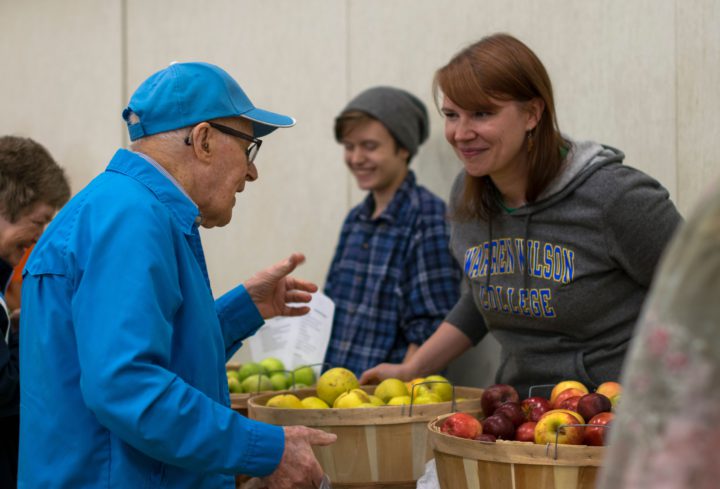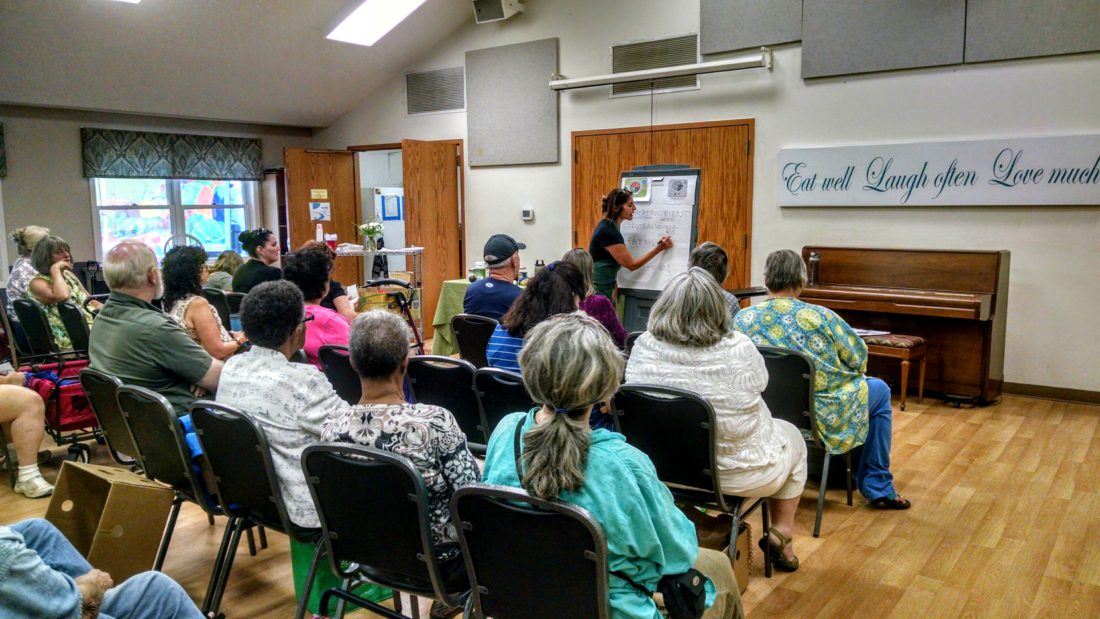It’s a few minutes past 4 p.m. on a cold Friday afternoon in January, and Black Mountain Presbyterian Church is already brimming with activity. Dozens of volunteers rush to set up tables bearing baskets filled with sweet potatoes, butternut squash, bright red tomatoes and other fresh foods, while more than two dozen community members file into a small room to attend a class on nutrition led by Abbie Young.
Stopping to talk with friends, volunteers and clients, Ali Casparian gradually makes her way toward a table in a corner of the room as a small crowd starts to gather for tonight’s cooking demonstration.
Casparian is the founder of Bounty & Soul, a Black Mountain-based nonprofit that provides a range of services to at-risk and food-insecure community members. Through five weekly markets, the organization distributes thousands of pounds of donated fruit, vegetables, toiletries and pet food to more than 50 local households in Black Mountain and Swannanoa, with plans to add more outlets and expand into other areas.
But for Casparian, a certified health and wellness coach, creating and maintaining healthy communities involves more than simply handing out fresh food. It requires what she calls a “whole person” approach that encompasses access to nutritional education, transportation and community support. In a mere five years, the nonprofit has expanded its roster of services to include fitness classes, courses in English as a second language, cooking demonstrations, health coaching and more.
“I feel strongly about equity,” says Casparian. “Where we fall economically, whether it’s permanent or temporary, doesn’t matter: We meet you where you’re at, and let’s do this together.”
A planned partnership with the Mountain Area Health Education Center and Asheville Buncombe Community Christian Ministry, slated to launch very soon, will enable Bounty & Soul to expand its approach to food insecurity to include the many social factors that also influence health. ABCCM’s crisis ministry in Candler will host one of Bounty & Soul’s food markets, and MAHEC will offer community members free health counseling and other services there.
“Health is not just about food: It’s also all of these other things that add into a person’s health and well-being,” Casparian explains. “You can’t isolate one piece of it, because the system is broken in a way. If you’re not addressing pieces of the system in a collective way, then you’re just treating the symptoms.”
Piece of the pie
A person’s health, notes Ameena Batada, is determined by many overlapping factors, including individual behaviors and social determinants as well as biology.
Often overlooked factors such as transportation, affordable housing, early childhood education and economic stability play an enormous role in predicting health and well-being, says Batada, an associate professor of health and wellness at UNC Asheville.
“Fifty percent or more of your health is determined by your environment,” she explains. “Some people would say even more.”
Research suggests that access to high-quality early childhood education, for example, is a key social determinant of health. A 2013 report by the U.S. National Library of Medicine found that children who attend underfunded schools tend to experience more violence, stress and poorer overall health both during their school years and throughout their lives.
While awareness of the impact of such social factors continues to grow, Batada says the concept of investing in social institutions to promote better health outcomes can be found throughout history and across the globe.
“Really, this is an idea that’s as old as society itself. If you look at other countries, many of them have emphasized the social determinants of health through paid parental leave, living wage policies and other social strategies, because they know that it’s important for the well-being of their society,” Batada points out. “The term itself may be relatively new, but this idea that good social interventions are translated into positive health is not a new one.”
Weighing the costs
Poverty affects people’s access to both health care and healthy food, and this is a particular challenge for North Carolinians, says Fred Stichel, a registered dietitian at MAHEC. According to a report from the Center for American Progress, a research group that focuses on social and economic issues, nearly 15 percent of the state’s population (almost 1.5 million people) falls below the poverty line. Thirty-six states — including Virginia and Florida — have lower poverty rates, the study found.
And poverty, says Stichel, increases the likelihood of chronic diseases, including diabetes. But ultimately, he maintains, availability, not cost, is the biggest barrier to a healthy diet.
“The answer I get from people very often is, ‘I can’t afford to eat that way.’ Of course, when we actually go through the costs of going to McDonald’s or getting a bag of frozen vegetables, a bag of dried beans and a bag of brown rice, you could clearly feed your family a lot longer on the latter,” Stichel explains. “But in a lot of communities, you don’t have grocery stores nearby, and if you don’t have good transportation, you have to get food maybe from the convenience store or the gas station. All of those things play into health outcomes. I think the bigger issue is not the cost of fresh, healthy food — it’s the access to it.”
A lack of care
Another problem is a shortage of health care professionals across the state, particularly in rural areas, notes Dr. Jeff Heck, a practicing physician who’s also MAHEC’s CEO. According to statistics from the North Carolina Health Professions Data System, 17 rural counties don’t have a pediatrician, 87 lack an OB-GYN specialist and 31 are without a psychiatrist.
“Generally, most trainees live, practice and work within 50 miles of where they train,” says Heck. “The inequity of that is that you have states like North Carolina, which is 562 miles across, and segments of the state that aren’t getting any help at all. We have enough doctors in the United States and in North Carolina, but they’re not distributed properly,” he explains. “There aren’t enough people who work for poor communities, for rural communities, for underserved minorities.”
Part of MAHEC’s focus, says Heck, has been not just to educate future medical care providers but to give them incentives to work in rural and impoverished areas.
“We know that if we admit a medical student to UNC and they grew up in a rural area, they are 4.5 times more likely to practice in a rural area. If they go into primary care, which is what we train, they’re 8.5 times more likely. We have a lot of programs out in rural communities to encourage kids to choose health care professions. Once they get into their universities, we have rural programs in partnership with both Western [Carolina University] and UNCA, internships and other opportunities.”
All together now
For Casparian of Bounty & Soul, working with a range of service providers is crucial to addressing the social determinants of health. Currently, her nonprofit partners with other local organizations such as Our VOICE, Pisgah Legal Services and the Black Mountain Counseling Center to provide much-needed resources for residents.

“We’re certainly looking at every aspect and also not doing what others are already doing, but developing partnerships,” she reports.
Bounty & Soul’s new collaboration with MAHEC and ABCCM will be another way to connect the health education center’s patients with sources of healthy food and other community members with health professionals, all while educating future care providers.
“We’re going to have a place where we can send patients who say, ‘I can’t afford to eat healthy,’” Stichel explains. “It’s also a great opportunity to educate all of the learners here.”
In addition, notes Casparian, partnering with other organizations reinforces a sense of shared community purpose.
“We have to address everything. We’re constantly looking for our part that we can address and where we can bring others in,” she says. “It’s not rocket science. We’re just trying to build a resilient community where we are there for each other and we problem-solve together and where everybody also has a part in it.”




Heroin is terrible for your health as well.